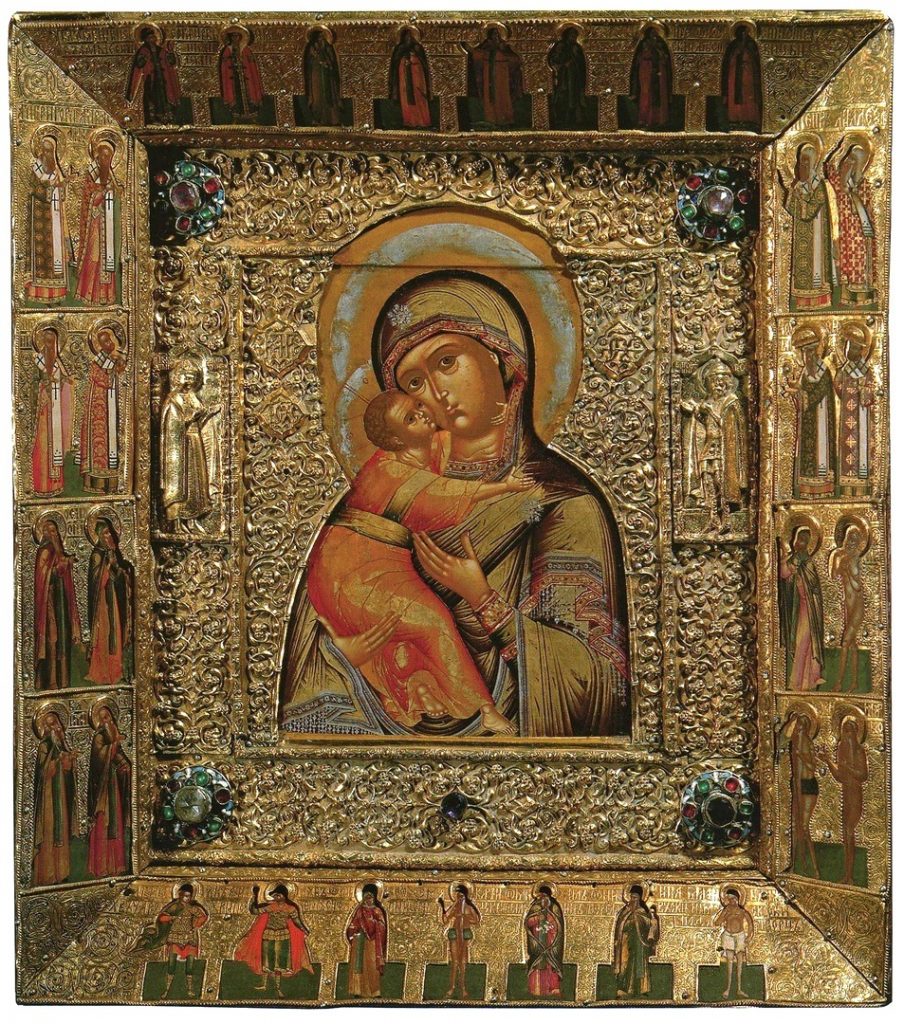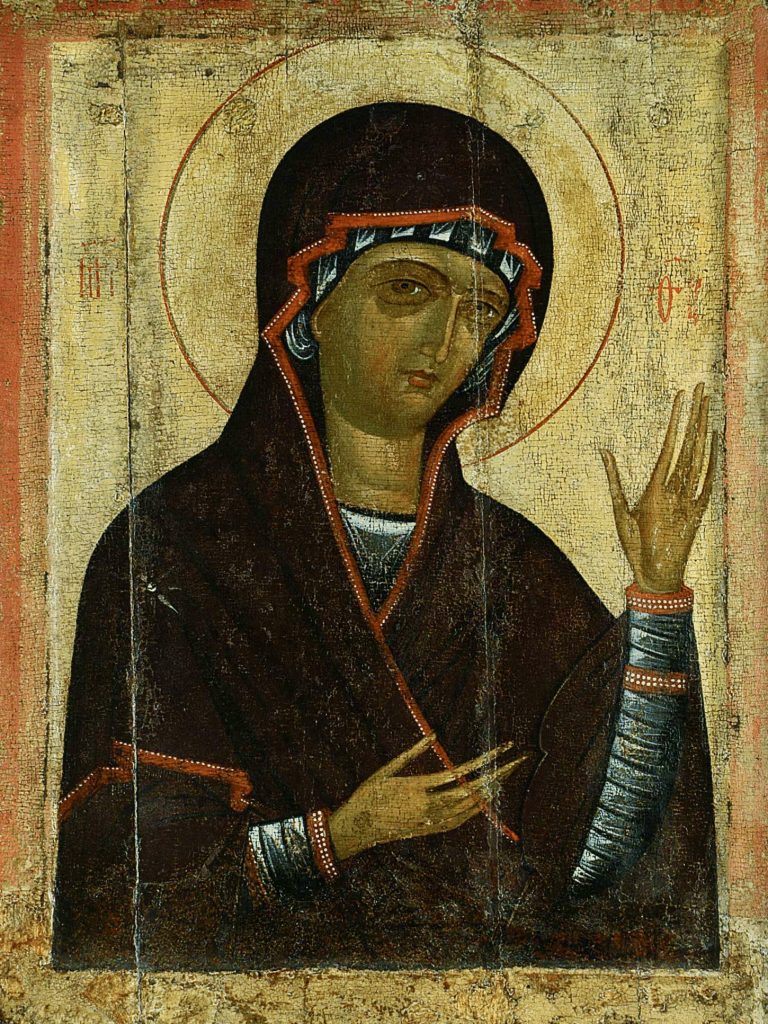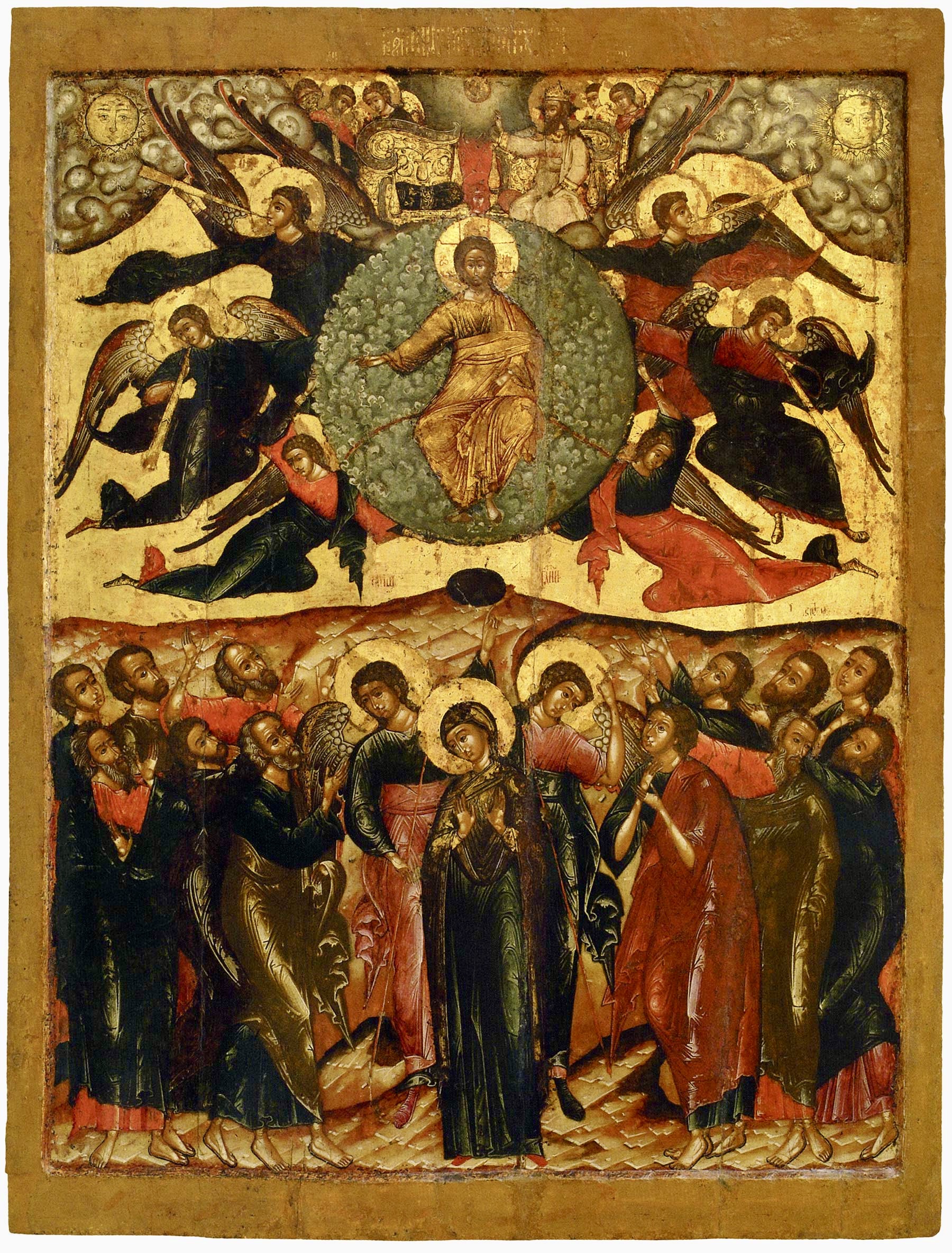A Supplicatory Canon to the Most Holy Theotokos
 Ode I, Irmos: When Israel walked on foot in the sea as on dry land, * on seeing their pursuer Pharaoh drowned, * they cried: * Let us sing to God * a song of victory.
Ode I, Irmos: When Israel walked on foot in the sea as on dry land, * on seeing their pursuer Pharaoh drowned, * they cried: * Let us sing to God * a song of victory.
Most Holy Theotokos, save us.
Drive the cloud of the passions from my mind, О pure one, and shine light upon me, О most pure one who hast given birth to the Son, the Effulgence of the Father, that I may hymn thee.
Most Holy Theotokos, save us.
Come, ye people, and like Gabriel let us cry aloud to the Virgin with reverence of soul: Truly adorned art thou, О pure one who hast given birth to Joy! Rejoice, most pure one!
Glory be to the Father, and to the Son, and to the Holy Spirit.
The Son Who was dispassionately begotten of the Father before all ages didst thou in latter days bear in thy womb, О most pure one, giving birth to Him as both God and man.
Now & ever, and unto the ages of ages. Amen.
Without corruption thou hast given birth to the one God, and didst remain a virgin after giving birth, as thou wast before birth-giving, О most pure one; wherefore, we, the faithful, cry out to thee: Rejoice!
Ode III, Irmos: There is none as holy as Thou, * O Lord my God, * who hast exalted the horn of Thy faithful O good One, * and strengthened us upon the rock * of Thy confession.
Most Holy Theotokos, save us.
There are none as immaculate as thee, О all- pure Theotokos, who hast given birth to the Creator and Master of all things; wherefore, all of us, the faithful, cry out to thee in thanksgiving: Rejoice!
Most Holy Theotokos, save us.
The cruel waves of the passions buffet me, О pure one, and I am truly cast into the abyss of evils by my many bitter falls. О pure one, extend to me a helping hand, and save me.
Glory be to the Father, and to the Son, and to the Holy Spirit.
Break through the darkness of my transgressions, О Virgin, and shine upon me the light of dispassion, О pure one who ineffably hast given birth to the intangible Sun.
Now & ever, and unto the ages of ages. Amen.
Having cleansed me of transgressions and defilement with the fire of the fear of God, О Maiden, clothe me in the radiant vesture of the virtues and set me among the choirs of the saints.
Ode IV, Irmos: Christ is my power, * my God and my Lord, * the holy Church divinely singeth, * crying with a pure mind, * keeping festival in the Lord.
Most Holy Theotokos, save us.
With thy radiance dispel the gloom of my many transgressions, О most immaculate Lady who hast given birth to the Light, Who hast shone upon the faithful the Sun of righteousness.
Most Holy Theotokos, save us.
In mine affliction I now set my hope on thee, О most pure one. Let me not depart from thee untreated, but rather rejoicing, having received salvation.
Glory be to the Father, and to the Son, and to the Holy Spirit.
О most pure one, grant thy rich compassions unto us who with faith and love have recourse to thy temple, and deliver us from all temptations and sorrows.
Now & ever, and unto the ages of ages. Amen.
The Word made His abode within thee, О most pure Lady, delivering the world from the mindlessness of the passions, and granting the kingdom of heaven unto those who hymn thee.
Ode V, Irmos: Illumine with Thy divine light, I pray, O Good One, * the souls of those who with love rise early to pray to Thee, * that they may know Thee, O Word of God, * as the true God, * Who recalleth us from the darkness of sin.
Most Holy Theotokos, save us.
With the divine radiance of Him who shone forth from thy womb do thou illumine my soul which sleepeth in darkness, О Virgin, and drive away the darkness of sin, illumining me with thy light.
Most Holy Theotokos, save us.
Heal thou my soul, which hath fallen among thieves, О good one, pouring forth the oil of mercy and the wine of thy tenderheartedness upon my wounds, granting me abundant understanding.
Glory be to the Father, and to the Son, and to the Holy Spirit.
Heal thou the infirmities of flesh and soul of us who have recourse to thee, О all-hymned one; for thou art the strength of those who flee beneath the shelter of thy supplication, O Theotokos.
Now & ever, and unto the ages of ages. Amen.
The Holy Spirit of God, dwelling within thy womb, О most pure one, and overshadowing thee, showed thee to be the habitation of the Trinity, for at the Father’s good pleasure thou didst conceive the Son and give birth unto Him.
Ode VI, Irmos: Beholding the sea of life surging with the tempest of temptations, * I run to Thy calm haven, and cry to Thee: * Raise up my life from corruption, * O greatly Merciful One.
Most Holy Theotokos, save us.
Dispel the gloom, of mine accursed soul, and shine upon me the light which shone forth from thy womb illumining all human nature, О most pure one.
Most Holy Theotokos, save us.
Deliver me from the assaults of enemies visible and invisible, О pure one, and grant me the mighty shelter of thine aid; for to thee, О Virgin, have I now fled.
Glory be to the Father, and to the Son, and to the Holy Spirit.
He Who created all things became incarnate through thy holy womb in the latter days and, setting aright human nature, which had grievously fallen through Adam, He hath restored the world.
Now & ever, and unto the ages of ages. Amen.
The majesty of the angels hymned thee, О most immaculate one, and I beseech thee: Drive from me the unseemly fantasies of the demons, preserving my heart in peace.
Lord, have mercy. Lord, have mercy. Lord, have mercy.
Glory be to the Father, and to the Son, and to the Holy Spirit; now & ever, and unto the ages of ages. Amen.
Sessional Hymn, in Tone VI: The majesty of the angels hymned thee, О most immaculate one, and I beseech thee: Drive from me the unseemly fantasies of the demons, preserving my heart in peace.
Ode VII, Irmos: An Angel made the furnace bedew the holy Children. * But the command of God consumed the Chaldeans * and prevailed upon the tyrant to cry: * O God of our fathers, blessed art Thou.
Most Holy Theotokos, save us.
Shedding unapproachable light upon me who am in the darkness of ignorance, О most pure one, guide me to the Light, that I may piously cry out to thy Son with faith: Blessed is the God of our fathers!
Most Holy Theotokos, save us.
Drive the cloud of gloom from my soul, О Theotokos, illumining me with the light of the Creator of all; for thou art the receptacle of the pre-eternal Light Who shone forth dispassionately from the Father.
Glory be to the Father, and to the Son, and to the Holy Spirit.
Incline thyself to our pleas, О pure Theotokos, and in thy mercy be thou moved to entreat God, rendering Him merciful to us who ever place our hope in thee, О good one.
Now & ever, and unto the ages of ages. Amen.
Grant cleansing unto me who am defiled by the passions of wicked deeds, О pure one, and send me tear-drops to wash away the evil shame of my sin, the outpouring of filth.
Ode VIII, Irmos: Thou didst make flame bedew the holy children, * and didst burn the sacrifice of a righteous man with water. * For Thou alone, O Christ, dost do all as Thou willest, * Thee do we supremely exalt throughout all ages.
Most Holy Theotokos, save us.
О Maiden who hast given birth to the Master of all in the flesh, rescue me from the violence of the passions, and unite me to the Creator of all by love, that I may hymn Him throughout all ages.
Most Holy Theotokos, save us.
By thy visitation, О Maiden, raise me up who lie upon the bed of pain, and grant health of body and soul unto me who hymn Christ throughout all ages.
Glory be to the Father, and to the Son, and to the Holy Spirit.
With the dew of thy supplications quench thou the flame of my pas- sions, О Lady, and save me, as before thy Son saved the children who supremely exalted Him.
Now & ever, and unto the ages of ages. Amen.
I fear not the treachery of the foe, setting my hope and expectation upon thee, О good one; for thou dost ever help, saving those who praise thee from misfortunes.
Ode IX, Irmos: It is impossible for mankind to see God * upon Whom the orders of Angels dare not gaze; * but through thee, O all-pure one, * did the Word Incarnate become a man * and with the Heavenly Hosts * Him we magnify and thee we call blessed.
Most Holy Theotokos, save us.
From all manner of evils deliver me who have recourse to thee with faith, О most pure Virgin, and grant health and deliverance from the wicked unto me who flee to thy protection, О Maiden, that I may ever glorify thee with cries of thanksgiving.
Most Holy Theotokos, save us.
Thou hast abolished the curse of grief, О pure one, and hast poured forth joy upon the world through thy birth-giving, having borne the Well-spring of blessing. Wherefore, praising thee, the all-hymned one, all of us, the faithful, ever bless thee with thanksgiving.
Glory be to the Father, and to the Son, and to the Holy Spirit.
Thy womb became a receptacle of the Light Who shone forth from the Father before all ages, О all-hymned Theotokos; wherefore, we all glorify thee, the Theotokos, and magnify Him as thy Son and God.
Now & ever, and unto the ages of ages. Amen.
When the divine Spirit had come upon thee, thou hast given birth in time to the timeless Son who shone forth from the Father; wherefore, with tongue and heart all of us, the faithful, confess thee to be the Theotokos who knewest not a man.
 Ode I, Irmos: Christ, who with an upraised arm * bringeth wars to naught, * hath shaken horse and rider in the Red Sea; * but Israel hath He saved * as they chanted a song of victory.
Ode I, Irmos: Christ, who with an upraised arm * bringeth wars to naught, * hath shaken horse and rider in the Red Sea; * but Israel hath He saved * as they chanted a song of victory. In the Name of the Father and of the Son, and of the Holy Spirit.
In the Name of the Father and of the Son, and of the Holy Spirit.